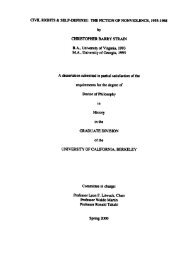Negro Digest - Freedom Archives
Negro Digest - Freedom Archives
Negro Digest - Freedom Archives
Create successful ePaper yourself
Turn your PDF publications into a flip-book with our unique Google optimized e-Paper software.
answering ; "Monday. That is if<br />
that's agreeable." It was with him .<br />
Going home! And in a matter of<br />
a few days . Two decades stood between<br />
my alma mater and hometown<br />
and me ; for me, it was a<br />
period of growth, mobility, turbulence<br />
and commitment, and I presumed<br />
it to be not too different<br />
back home . I now lived in the<br />
suburbs of San Francisco Bay<br />
Area in an integrated neighborhood<br />
with my dentist husband and<br />
five children ; we wore the badge<br />
of acceptance for having "made it"<br />
in the good old American free-enterprising,<br />
"mainstream" tradition.<br />
But already my third teenager to<br />
graduate from the local high school<br />
in as many years was saying, "Forget<br />
it . I'm tired of being exotic ; a<br />
museum piece, the social integrator<br />
; I choose a <strong>Negro</strong> college-one<br />
of those in Nashville." I pointed<br />
out to the young ones the fact that<br />
they could very well be sentimentalizing<br />
the southern situation<br />
since, unlike me, they had not<br />
grown up in a segregated environment<br />
. Still failing to dampen their<br />
enthusiasm, I reminded them that<br />
Nashville was the home that I had<br />
been orphaned from, and not them,<br />
They checked me with, "You<br />
better know it ."<br />
For two years, I had worked as<br />
a part-time instructor in two junior<br />
colleges . One of these was a nearly<br />
all-white suburban tomorrowlandtype<br />
institution ; the other a ghettofringed<br />
urban yesteryear model<br />
with over 2,000 black students .<br />
Having asked myself a few ques-<br />
NEGRO DIGEST March 1969<br />
tions, such as, To whom did I owe<br />
my allegiance? Where were my<br />
teaching skills most needed? Which<br />
situation offered the greater reward<br />
in humanistic rather than materialistic<br />
terms?, even as I noted the<br />
leaded nature of them, I knew the<br />
proper answer. Perhaps I always<br />
knew it, just as most black intellectuals<br />
have known it . Factors<br />
such as the vast difference between<br />
the two plants-both of whom I<br />
supported through taxes-the aura<br />
of academic freedom and exploration<br />
which seemed far more prevalent<br />
in one ; the huge investment in<br />
terms of personal involvement and<br />
extra curricular time which one<br />
demanded in order to meet the<br />
community's needs succeeded in<br />
clouding the real issue . But, I had<br />
already returned the shiny new<br />
key to my office in the suburban<br />
school and was ghetto-bound when<br />
I heard that Fisk was in need of<br />
English teachers, black ones . And,<br />
then, there was Stanford Cameror_'s<br />
exhortation in the May 1967<br />
NEGRO DIGEST, "Come Home<br />
Black Intellectuals- Before It's<br />
Too Late ."<br />
"You Can't Go Home Again,"<br />
seems closer to the truth, according<br />
to my own personal experience.<br />
John O. Killens, writer-in-residence<br />
at Fisk, has identified the<br />
problem of the century and the<br />
main job of the Black Revolution<br />
as that of the "deniggerization of<br />
the world." And when he points<br />
out that minds enslaved with words<br />
must be freed with words, it seems<br />
he offers a direct challenge to black<br />
55
















